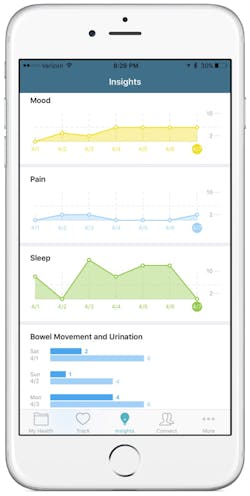Teams at Boston Children’s Hospital’s Innovation & Digital Health Accelerator (IDHA) and Duke Health System collaborated to develop an app, called Caremap, that aims to help parents and families organize and monitor their children’s health. The app is designed to be a resource for families, particularly those whose children have complex medical needs.
Designed for iOS, the app was built using the Apple CareKit framework and is available for free in the App Store.
The app enables family caregivers to securely store vital medical information and share it with health professionals as part of their care or in an emergency. Families can also use the app to track health metrics important to them and gain insights to inform their child’s care.
According to developers, the app will especially benefit children with complex medical needs, who number an estimated 500,000 in the U.S. “These children make frequent health care visits, tend to see multiple specialists, and may require emergency care away from their medical home. Using Caremap, their families can give medical providers critical information such as allergies, medical equipment they rely on and emergency action plans, by showing them the app or sending a PDF snapshot via email,” the app developers say.
The app enables families to track parameters like exercise, mood, pain and sleep, and add custom metrics of their choice, like school attendance or temper tantrums. They can view the data in colorful graphs to see trends and patterns. Caremap uses the Connect module to make it easy to share data and communications with the patient’s care team, including doctors, other healthcare professionals, family and other loved ones.
“We wanted to provide a trusted and much-needed resource that would harness the patient voice and family perspective,” Caremap clinical lead Michael Docktor, M.D., a gastroenterologist and Clinical Director of Innovation at Boston Children’s IDHA, said in a statement. “The ability to track custom parameters provides an important window into patients’ lives that is not captured in the electronic health record, but is important to families.”
“Effectively managing communication between numerous providers who care for a child with medical complexity can be a full-time job for parents,” Caremap clinical advisor David Y. Ming, M.D., a hospitalist at Duke University Medical Center and director of Duke Children's Complex Care Service. “So much effort is required to keep track of the details that often the ‘bigger picture’ perspective can get overlooked. The priority with Caremap is not only to organize relevant clinical details, but also to highlight the overall care goals. This will allow providers to know the child’s medical problems and understand directly from parents what matters most for their child and what makes their child unique. These features make this a particularly exciting opportunity to improve care for children with medical complexity.”
Laurie Glader, M.D., director of Boston Children's Complex Care Service Outpatient Program and co-director of the Cerebral Palsy and Spasticity Center, was also a consultant during Caremap’s development and she contends that the app will improve routine care by helping initiate conversations between families and providers and concretely documenting what’s been going on with a child.
“Families can track a symptom or something else they’re worried about and see patterns over time,” she says. “The parent can say ‘That’s actually better since such-and-such has been under control,’ or a provider can point out, ‘Look how much more frequently that’s happening now.’ If we start a new medication, they can track how their child responds. But the most important part of the app is that everything is centered on the family’s goals and priorities.”
The development team at Boston Children’s and Duke plans to add more functions over time. Their first goal is to connect Caremap to Cerner and Epic, the two largest electronic medical systems, via the FHIR interoperability interface. Eventually, they plan to add secure cloud connectivity; for now, data live only on the user’s iOS device.


